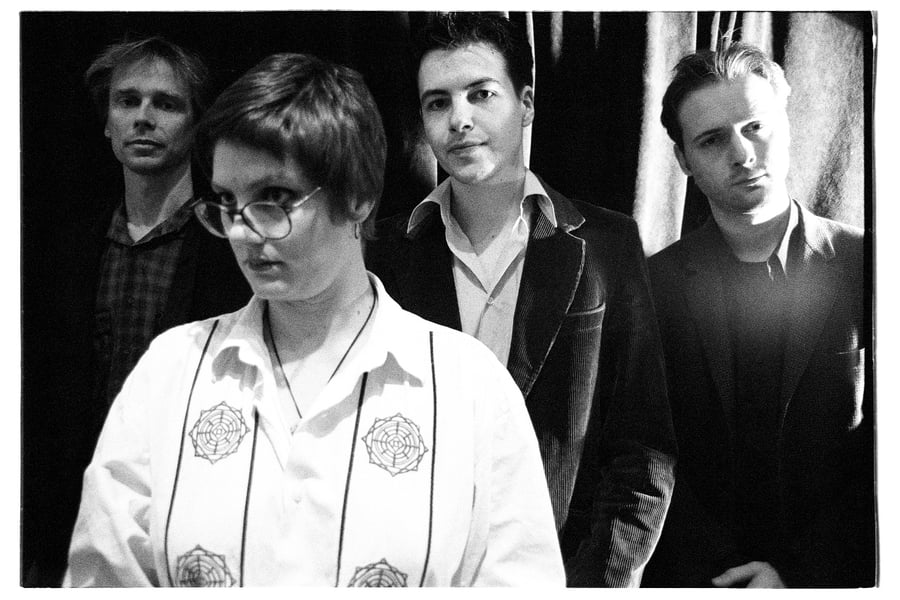In 1997, Sydney band Big Heavy Stuff were chosen to support Radiohead on their national OK Computer tour.
In this extended excerpt from our full Rolling Stone AU/NZ feature, drummer Nick Kennedy shares what it was like to be on the road with a band caught in the supernova of global fame, and the reality of becoming a band that hits the big time.
“A friend of ours had interviewed [Radiohead bassist] Colin Greenwood for 2SER on Radiohead’s low key tour for The Bends, and had maintained a friendship with him. Colin rang her up and said, ‘Who should we get to support?’ She said ‘There’s only one band you should get to support you: Big Heavy Stuff’. God bless her. I think our management put a press release out at the time saying, ‘Big Heavy Stuff was handpicked for the Radiohead tour’, which, you know, was playing with the truth, but you use what you can.
“It was great because we were playing entertainment centres around the country. We could have done New Zealand too – I wish we had, but we just didn’t have the money. It cost us. We needed 10 grand just to do the tour, because our record company had put out Maximum Sincere and had spent what would have been our tour support on a whole bunch of glossy postcards and stuff like that. And then we got the Radiohead tour, and we said, ‘You wouldn’t have any tour support, would you?’, and they went, ‘Oh no, we spent all that’. So the band got credit cards and we paid for the Radiohead tour, and then by the end of the tour, cause the money you get from ASCAP was based on bums on seats in 10,000 seaters, we broke even. We got $500 a show from Radiohead and then they said, ‘Do you want to do New Zealand?’, and we went, ‘We’d love to, but can we maybe get $700?’ And they said, ‘No, no, you can’t’, so I was like, ‘OK, well, we can’t do it’. That was the reality of what it was like.
“Having the sideshow seat to that was amazing, though. Some people had said there were similarities between [Radiohead and Big Heavy Stuff]. But when I saw them play OK Computer, I felt like we were a garage band, because they were dancing on massive guitar pedal things. They had so many things going on that the entire time every member of the band was just concentrating. Like, they couldn’t even look up once and go, ‘Oh, nice audience’. They had a million things going on, which was awesome. It was great to be able to see that and see them execute something so deftly.
“Colin and Ed [O’Brien, guitarist] were very forthcoming and very nice to us, but Thom hadn’t seen us the entire time, like hadn’t come and said anything. There was one time I bumped into him in Sydney at the back of the Entertainment Centre and it was the fourth show. And I said, ‘Hey Thom, how are you going?’. And he just looked at me like, ‘Who are you?’ He looked completely confused. And I was kind of like, ‘Alright, dude’.
“On the last night of the tour, me and Eliot made it a point to go into [Radiohead’s] dressing room and say thank you, which we did. But Thom was kind of in the fetal position on the couch, and he was smoking a joint, and he was completely out of his mind. And suddenly that meeting that I’d had with him a couple of nights before made more sense. They were filming footage on the tour for a documentary [1998’s Meeting People Is Easy], where they were painted as musicians struggling with the place that they were at at the time.
Love Music?
Get your daily dose of everything happening in Australian/New Zealand music and globally.
“Then, of course, they did what [Big Heavy Stuff] used to do, and shoved a spanner in the works [with Kid A], but how they did it was way more successful than how we did, but there are parallels there. They made Kid A and confounded expectations, and I think we really wanted to do that. We just didn’t know how to articulate it, whereas they did it so well either by accident or by design, it doesn’t really matter now. It felt like a really gutsy thing to do, because they were the hottest thing, and then they went, ‘Well, we could really capture the audience with an anthem now’, but instead they did something else and remained artistic. We really liked that idea – we all did in the Nineties. Artistic integrity was the big thing and not selling out was the big thing and I struggle to know how you explain that to a younger person now, because if you don’t sell out, you’re not involved in the game anymore. And I guess it turned out that we weren’t either, you know.”
Big Heavy Stuff’s Bruises is out now on double vinyl, CD and cassette.



































